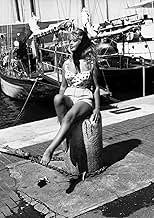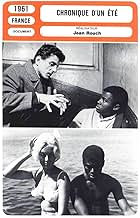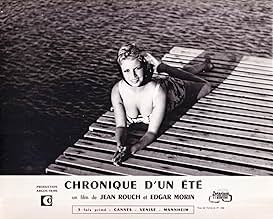VALUTAZIONE IMDb
7,5/10
3855
LA TUA VALUTAZIONE
La vita quotidiana dei comuni parigini, realizzato nello stile del cinéma vérité.La vita quotidiana dei comuni parigini, realizzato nello stile del cinéma vérité.La vita quotidiana dei comuni parigini, realizzato nello stile del cinéma vérité.
- Premi
- 1 vittoria in totale
Marceline Loridan Ivens
- Self
- (as Marceline)
Marilù Parolini
- Self
- (as Mary Lou)
Jean-Pierre Sergent
- Self
- (as Jean-Pierre)
Jacques Gautrat
- Self - un ouvrier
- (as Jacques)
Régis Debray
- Self - un étudiant
- (as Régis)
Nadine Ballot
- Self
- (as Nadine)
Modeste Landry
- Self - un étudiant africain
- (as Landry)
Jacques Gabillon
- Self - un employé
- (as Jacques)
Simone Gabillon
- Self - une employée
- (as Simone)
Recensioni in evidenza
This film is incredibly poignant and essential in understanding the history of documentary film-making. Set in 1960's France during the Algerian War (France's equivalent of Vietnam), the viewer is taken on the journey of the lives of some incredibly interesting young adults. The film begins by reeling interviewees in with the simple question, "Are you happy?" Of course this is only a spring board for the subjects to invite us into their lives. Race relations, holocaust memories, mental illness, and so much more plague our subjects, both creating fear and excitement within the viewer. Not to mention there is a very cool, very unique ending, ala Robert Flaherty. Not to be missed.
This film, made in the summer of 1960 by the sociologist Edgar Morin and the ethnographer Jean Rouch, aimed to be as 'true as a documentary, but with the content of a fiction film.' Facilitated by improved technology (16mm film, sync sound, light hand held cameras) it pioneered a direct or live aesthetic dubbed 'cinema verite'. It was to film 'true life', but engage on a subjective level, getting people to talk about their experiences and ambitions, and most notably, whether or not they are happy. What emerges is an absolutely overwhelming cinematic experience, a film that is deeply affecting but also that makes you think. The film begins with a market researcher, Marceline, on the street, asking people whether or not they are happy. This sequence seems to me both to confirm the importance of human relationships and point up the dissatisfaction that living in a society about to tip into consumerism engenders. The film then moves to concentrate on a set of characters. Morin was criticised for his structural approach, typing his characters (i.e. a factory worker, a petit bourgeois, a student), but a real sense of the individuals involved shines through, notably in the sequences with Angelo and Landry chatting, and Marceline recounting her experience of deportation during the war. The most revolutionary part of this film is that the makers demonstrate the impossibility of documentary objectivity when they film themselves filming - they show how the truth of the film is constructed. Questions of authenticity abound. At the end of the film, they screen it to the characters involved. Even those filmed are unable to decide whether they were acting ('hamming for the camera') or being themselves. Morin and Rouch conclude they have failed in their aim to offer a slice of life, as the very act of filming something transforms it. Truth is elusive in the attempt to represent the everyday. This film is far from a failure however - watch it and be blown away.
By 1960 the documentary had evolved with new sound equipment and lighter cameras. In a direct line from the ideas of Flaherty and Vertov, Canadian filmmakers as Michel Brault had made significant shorts as "Les raquetteurs" (1959), while in the United States Robert Drew created his seminal work, "Primary" (1960.) All this activity helped the launching of "cinéma vérité" in France, with this film manifesto made by anthropologist Jean Rouch and sociologist Edgar Morin. With a "caméra vivant" (living camera) and the question "Are you happy?", they went out to the streets of Paris to make a survey, showing passages in the life of students, workers and migrants (including Joris Ivens' future wife), with a short escapade to the St. Tropez beach, and a final confrontation of the creators and subjects with the footage and the idea of constructing objective pieces of reality on film. Rouch and American Frederick Wiseman believed in a kind of documentary open to emotional spaces and fantasy (as opposed, for example, to Richard Leacock's more naturalistic approach), and eventually changed the tone of their works, while the movement finally identified with the concept of "direct cinéma", developed by Canadians and American filmmakers.
"Chronicle of A Summer" invented the cinema verité movement, the idea being that by celebrating and revealing the artificial nature of the film-making process, the truth, or more accurately, some truths will emerge. The film is enveloped with a luminous and appealing humanism, and it is a very cool and cinematic portrait of Paris in the beat days. Remember that World War Two was only a decade or so before this and somehow the fog of that war hangs over the film, especially given the backstory of one of the participants, at least this is what I remember..As historic documents go, it is also amazingly compelling today. I find the film much more absorbing than "Salesman" or Drew Associates stuff. Drink espresso instead of a pint before the film, my friend and you'll be fine..
JB-81
PS If you want to watch paint dry, check out Melville- Although he's pretty great too..
JB-81
PS If you want to watch paint dry, check out Melville- Although he's pretty great too..
Jean Rouch is remembered as an oddity in film history, an artist working in between of fact and fiction as well as the era of colonialism and post-colonialism. He is especially often crowned as the founder of ethnographic cinema, but "Chronicle of a Summer" (1961) made by Rouch and Edgar Morin is something a little different. It is the breakthrough film of cinéma vérite or "truth cinema" which had a huge impact on the following French New Wave, most of whose filmmakers admired Rouch.
Already in his earliest documentaries, Rouch isolates himself from his own time by focusing on engagement and immersion instead of observation. Interaction between the observer and his object -- or rather between subjects -- becomes vital. As vital is embracing the presented subjects' personal and collective world views, which form a fascinating entirety in Rouch's "I, a Black Man" (1958). In a word, the other and the self are of the same reality to Rouch.
Although a representative of so-called truth cinema, Rouch and Morin's film does not concern any epistemic and scientific truth, but rather the truth of the appearance of the intersubjective reality. The camera takes part in action, ceases to exist, but at the same is inseparably present. A fabric of real emotions, thoughts, lies and acts is born which can be taken as a truth of one kind. On the one hand, Rouch and Morin attempt to revolutionize the cinema or at least to turn its lens to itself, but on the other, their sociological mission is to find out how does the modern man live. Hence they ask "Are you happy?" from random people in the streets.
Rouch's "The Human Pyramid" (1961) might be more well organized, though utterly poetic, than "Chronicle of a Summer", but the latter is more essay-like which also associates it with the new wave. The remarks of the meta-level are not as detached from the rest of the film as in "The Human Pyramid", but still fact and fiction merge in an essential fashion.
However, Rouch didn't only affect new wave filmmakers for his cinematic methods but also for his image of the world and man. There is indeed great human beauty in the film. During the interviews and other scenes, the camera becomes a penetrating mirror to whom one can reveal all of one's secrets. Perhaps this also happens to the viewer in a lesser extent. On one level, Rouch and Morin reveal the need to talk and share in an individualistic society. On the other, they tell something enduring about man, life and cinema.
Already in his earliest documentaries, Rouch isolates himself from his own time by focusing on engagement and immersion instead of observation. Interaction between the observer and his object -- or rather between subjects -- becomes vital. As vital is embracing the presented subjects' personal and collective world views, which form a fascinating entirety in Rouch's "I, a Black Man" (1958). In a word, the other and the self are of the same reality to Rouch.
Although a representative of so-called truth cinema, Rouch and Morin's film does not concern any epistemic and scientific truth, but rather the truth of the appearance of the intersubjective reality. The camera takes part in action, ceases to exist, but at the same is inseparably present. A fabric of real emotions, thoughts, lies and acts is born which can be taken as a truth of one kind. On the one hand, Rouch and Morin attempt to revolutionize the cinema or at least to turn its lens to itself, but on the other, their sociological mission is to find out how does the modern man live. Hence they ask "Are you happy?" from random people in the streets.
Rouch's "The Human Pyramid" (1961) might be more well organized, though utterly poetic, than "Chronicle of a Summer", but the latter is more essay-like which also associates it with the new wave. The remarks of the meta-level are not as detached from the rest of the film as in "The Human Pyramid", but still fact and fiction merge in an essential fashion.
However, Rouch didn't only affect new wave filmmakers for his cinematic methods but also for his image of the world and man. There is indeed great human beauty in the film. During the interviews and other scenes, the camera becomes a penetrating mirror to whom one can reveal all of one's secrets. Perhaps this also happens to the viewer in a lesser extent. On one level, Rouch and Morin reveal the need to talk and share in an individualistic society. On the other, they tell something enduring about man, life and cinema.
Lo sapevi?
- QuizThe 6th greatest documentary of all time according to the 'Sight & Sound' poll 2014. The list was compiled after polling from over 200 critics and curators and 100 filmmakers.
- Citazioni
Sophie - the cover-girl: People are bored everywhere now. But boredom comes from within. If you've got an inner life, you're never bored.
- ConnessioniFeatured in Les échos du cinéma: Episodio #1.23 (1961)
I più visti
Accedi per valutare e creare un elenco di titoli salvati per ottenere consigli personalizzati
- How long is Chronicle of a Summer?Powered by Alexa
Dettagli
- Tempo di esecuzione1 ora 25 minuti
- Colore
- Mix di suoni
- Proporzioni
- 1.37 : 1
Contribuisci a questa pagina
Suggerisci una modifica o aggiungi i contenuti mancanti

Divario superiore
By what name was Chronique d'un été (Paris 1960) (1961) officially released in India in English?
Rispondi



























